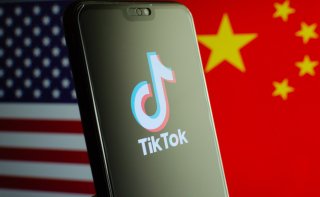Regulate or Ban TikTok? How Americans View the Potential Security Risk
We find clear support for regulating these social media apps; however, that support declines when considering an outright ban of such applications.
With increased bipartisan concern in Washington about the data collection and management practices of Chinese-owned social media applications such as TikTok, we inquired as to whether the public is similarly concerned.
In August of 2020, President Donald Trump signed an executive order to impose economic sanctions against Tiktok, which would have prevented the app from being updated and receiving advertising revenue from American companies. The Trump administration argued that this order was necessary due to the app’s ability to share data with its Chinese parent company, ByteDance, which then could be used by the Chinese government. Federal Courts blocked the Trump administration’s executive order from taking effect. The Biden administration revoked the executive order in 2021, but decided to study the application and how it manages data to determine the threat it posed to national security.
Then, in November of 2022, FBI director Christopher Wray testified to the Homeland Security Committee, stating his agency had “national security concerns” regarding the potential uses of TikTok both for data collection and for influencing via its recommendation algorithm. By mid-March, growing bipartisan congressional support sought to respond to security concerns associated with TikTok. Use of the app already was prohibited on government devices, and the Department of Justice announced an investigation into the parent company of TikTok over inappropriately obtaining data on American journalists. Legislative efforts, although still in their infancy, currently suggest the possibility of an outright ban of social media technology owed by adversarial countries, while critics suggest that regulation would be more suitable.
We ask whether the public supports either option. The assumption would be that Americans, even if concerned about Chinese influence, would support regulation over a ban. To address public support, we conducted a web survey via mTurk Amazon of 1,228 American respondents on February 28, 2023. After a series of demographic and attitudinal questions, respondents were randomly assigned one of two prompts to evaluate on a five-point Likert scale (strongly disagree to strongly agree).
The statements were:
Version 1: Social media apps owned by Chinese companies, such as WeChat and TikTok, should be regulated in the United States.
Version 2: Social media apps owned by Chinese companies, such as WeChat and TikTok, should be banned in the United States.
Overall, we find clear support for regulating these social media apps, with roughly two-thirds of respondents supportive of regulation; however, that support declines by 9 percent or greater when considering an outright ban of such applications. In addition, and consistent with the stronger anti-China sentiment overall, we see greater support for both regulation and for a ban among Republicans compared to Democrats.

After controlling for various demographic and attitudinal factors, we found that this pattern regarding support for regulation versus an outright ban endures. Furthermore, conservatives and those with more education were more supportive of regulation, while women overall were less supportive. We also asked respondents to rate China on a 1-5 scale (very negative to very positive) and find that views on China negatively correspond with support for any action against Chinese apps.
We also asked people to indicate on a scale of 1-5 whether a range of issues in U.S.-China relations were important or not, with a 1 being not important at all and a 5 being very important. People who indicated that cybersecurity was a more important issue were more likely to support regulating Chinese-owned apps, but this relationship did not hold when respondents were asked about a possible ban on foreign-owned apps.
There are several possible explanations for the strong support for regulation, but weaker support for banning foreign-owned apps. TikTok is an exceedingly popular social media app that has millions of users in the United States, so the opposition to banning the app could partially be a reflection of its popularity. Although not an app, Huawei phones and technology, which are banned in the United States, did not receive the same amount of attention since they had not taken hold in the United States at the time.
Admittedly, we acknowledge the limitations of our experimental web survey. In particular, we did not ask about the use of social media applications, with a March Washington Post poll showing starkly different views of a ban based on whether one used the application. Use also largely falls on generational lines. Many TikTok users are from Generation Z, a group underrepresented in Congress, one that current policymakers may underestimate, and from which we may see a potential backlash to policies toward the application.
Banning applications could also cause concerns about freedom of speech protections. Laws protecting free speech are a major reason why many European countries are not pursuing bans of TikTok despite the cybersecurity and data privacy concerns about the app. Policymakers would have to carefully consider laws around free speech to effectively craft a ban that would stand up to legal scrutiny.
Nevertheless, the results suggest a broad acknowledgment of the potential dangers of Chinese social media applications and a potential area for a bipartisan solution, though the data gives little indication as to what regulatory strategies the public would most support.
Timothy S. Rich is a Professor of Political Science at Western Kentucky University and Director of the International Public Opinion Lab (IPOL). His research focuses on public opinion and electoral politics, with a focus on East Asian democracies.
Ian Milden is a recent graduate from the master’s in public administration program at Western Kentucky University. He previously graduated with a bachelor’s degree in political science and history from Western Kentucky University.
Josie Coyle is an honors undergraduate researcher at Western Kentucky University, with majors in International Affairs and Chinese.
Image: Ascannio / Shutterstock.com

